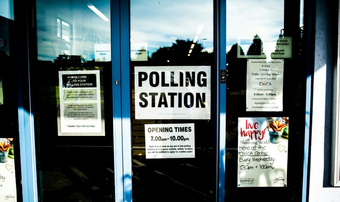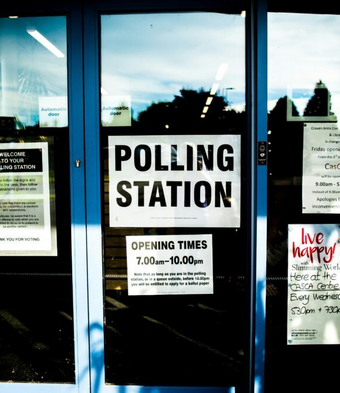Toxicity of gender debate must not stop us speaking God's truth

“The media cannot control what you think but it can determine what you think about.” I was reminded of these helpful words by Justin Giboney, an evangelical leader working in the US public square, when reading and listening to the coverage surrounding the Cass Report on children’s gender identity services in England this week.
You can find an excellent analysis of the Cass Report on gender identity services for children and young people in England by James Mildred here. Rather than repeat that analysis I want to consider what the coverage of the report says about the state of our public square and how we debate difficult and controversial issues.
“The paediatrician behind Wednesday's report, Dr Hilary Cass, said clinicians were… affected by the "toxicity" of public debate around transgender identities:
"There are few other areas of healthcare where professionals are so afraid to openly discuss their views, where people are vilified on social media, and where name-calling echoes the worst bullying behaviour. This must stop."
The fear and anxiety of speaking into the gender debate is not limited to healthcare professionals, just as gender is not the only issue people are fearful of discussing in public. From a personal perspective we at CARE know that there are many who seek to intimidate pro-life organisations sharing their views and evidence about life from conception, just as there are evangelicals that are persistently vilified for seeking to discuss what faithfulness and holiness looks like in the area of same sex attraction and sexuality.
I do not believe that any of these issues need to be the foundations of a culture war, but neither can we avoid discussing them or concede incredibly important issues without discussion, debate or scrutiny.
One of my observations from this week’s news coverage of the Cass Report is how quickly it moved through the news cycle. That meant profoundly important issues about gender ideology and services were, for the most part, very superficially covered.
This in turn must give us cause to question how many other important issues are not being covered by the media or discussed in public because of fear? And what is the implication of this?
In the book Tangled Webs: How False Statements Are Undermining America, author James Stewart argues that truth telling is an important moral value in society that is being eroded. He makes the case that honesty is crucial for social cohesion, and how damaging deception can be at an individual and societal level.
The Bible teaches us that the opposite of truth telling is not always a sin of commission; it can be a sin of omission. For truth telling, the truth must be told. In too many areas important truth is not shared because there are some who fear the consequences and others who do not want to hear evidence or experience that does not fit their viewpoint.
It is our responsibility – even calling - as Christians to raise uncomfortable topics where we believe truth is being obscured and harm being done. We do so motivated by a desire to echo the character and heart of God and respond to His love for us by seeking the wellbeing of others.
We might call this the prophetic duty the church. Like Jeremiah, Isaiah, Daniel, Ezekiel and others, there are hard truths we must proclaim. We must do so regardless of how they will be received by others in the public square. If we fail, then our silence contributes to the very problem we should be addressing.
The absence of truth telling in the Tavistock Clinic led to great harm. Thousands of young people were let down by the health professionals that were trusted to care for them. Our wider common good has also been harmed by the lack of transparency in how increasingly radical gender ideology was not questioned and therefore normalised and socialised beyond the Tavistock without due scrutiny or debate.
There are so many areas – like gender – where social attitudes and norms seem to be rapidly and fundamentally changing and it would be easy to allow the media – print, broadcast or social – to determine what we think.
Our country faces significant challenges in the years ahead, and we must have the courage to engage the big social and economic questions, as well as matters of international relations, and how our political institutions adapt to these challenges.
These are times for truth tellers who do not run away from challenging or intimidating questions, whose love for our neighbours and desire to promote the common good mean we do not simply concede important decisions to the loudest, scariest, voices. These are times for inquisitiveness, frankness, courage, respect, honesty, integrity, humility, compassion, boldness, confidence in the truth, and grace.
As Christians in the public square, we have amazing examples to follow. Consider Daniel, who was commanded to stop praying and put loyalty to God over loyalty to the system. Or consider the apostles Peter and John. They were told to stop preaching about Jesus. But in Acts 4:19-20, they asked the religious court what was right? To obey God or man? They said they were compelled to speak about what they’d seen!
And of course, we have the promise of King Jesus who will be with us, no matter the cost. Not only did he leave an example of courage for us to follow, he also promised that when we are engaged in defending and proclaiming the faith in the public square, we don’t need to fear not knowing what we will say. Luke 12:11-12 says:
When you are brought before synagogues, rulers and authorities, do not worry about how you will defend yourselves or what you will say, 12 for the Holy Spirit will teach you at that time what you should say.
We can speak into the debates of our day with the confidence that God’s word is relevant and good news. We can engage politicians, journalist, bloggers, podcasters, influencers, friends, colleagues, and those with whom we disagree. We do so wanting to understand, and graciously seek to be understood. We do so on issues that are important, even if they are difficult or controversial and been pushed out of the public eye and media spotlight. Let God’s word determine what we think and what we think about.






